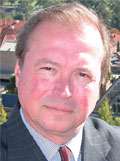International alert series: The BIG Issues - Free and Fairer Trade
Free and Fairer Trade: Can trade be both free and equitable in a global economy
Tuesday 6 June 2006
Presented by
World Vision Australia and AusAID
and supported by
The Bob Hawke Prime Ministerial Centre, UniSA
A series of bi-monthly forums, for dialogue, discussion and questions, on key international development issues involving and affecting the Australian community: July 2005 - October 2006
Free and Fairer Trade
Speakers
- Mr Andrew Stoler, Former Deputy Director-General of the World Trade Organisation and Director, Institute for International Business, Economics and Law, University of Adelaide
[Written remarks from Andrew Stoler available here] - Mr Tim Harcourt, Chief Economist, Australian Trade Commission
[Written remarks from Tim Harcourt available here] - Dr Patricia Ranald, Principal Policy Officer at the Public Interest Advocacy Centre (PIAC). PIAC is the host organisation for the Australian Fair Trade and Investment Network of 90 community organisations concerned about the social impacts of trade agreements.
[Paper delivered by Patricia Ranald available here]
Speakers unscramble the rhetoric to provide perspectives on what is required to guarantee a free trade system with benefits for all. What is at stake? What are the barriers? What are the opportunities? What is to be gained? How is the Australian government involved in trade negotiations in the world and at the Doha Round of the WTO and what role are NGOs playing in influencing the decision makers? How do the choices we make about what we eat and how we live affect the trade, livelihoods and wellbeing of poor people? What are the things we can do in our everyday life that can improve the outcomes for the less fortunate in our global community? And what can developing countries do?
 Mr Andrew Stoler, Former Deputy Director-General of the World Trade Organisation and Director, Institute for International Business, Economics and Law
Mr Andrew Stoler, Former Deputy Director-General of the World Trade Organisation and Director, Institute for International Business, Economics and Law
Andrew Stoler is the Executive Director of the Institute for International Business, Economics and Law and holds the title of adjunct Professor of International Trade at the University of Adelaide. Mr Stoler currently serves on the Australian Foreign Minister’s Aid Advisory Council and is a member of the Advisory Board of Stanford University’s GATT Digital Library. He is a member of the Advisory Committee of the Shanghai WTO Affairs Consultation Centre and a Senior Advisor to the Shenzhen WTO Affairs Centre. Mr Stoler is Director of the Trade Facilitation Alliance, a private sector not-for-profit organization promoting progress in negotiations aimed at removing unnecessary obstacles to efficient border clearance of goods.
Mr Stoler served as Deputy Director-General of the Geneva-based World Trade Organization (1999-2002) and as Deputy Permanent Representative of the United States to the GATT and WTO (1989-1999). Previously, as a senior official of the Office of the United States Trade Representative, Executive Office of the President (Washington, DC) he also served as Deputy Assistant US Trade Representative for Europe and the Mediterranean and as Director for Canada, Australia and New Zealand.
SUMMARY: Free and Fairer Trade – Workers’ Rights in Trade Agreements
Economic theory holds that trade liberalisation will benefit a country’s economy even where it is carried our unilaterally without the benefit of reciprocal concessions in an export market. Liberalisation at the border leads to lower prices for consumers, increased competition in the domestic marketplace, efficiency gains and a greater selection of products and services than are available when restrictions hamper trade flows. Trade liberalisation should breed employment benefits as well - as the economy grows, more and hopefully better-paying jobs will be created. But what about the conditions of workers in the workplace? Will a trade agreement lead to fairer conditions for workers? Does a rising tide lift all boats?
In this presentation, the speaker (former USTR Official and Deputy Director General of the WTO) examines the treatment of workers rights in international trade agreements. He looks at the history of the issue as it was addressed in the WTO and also what has happened on workers rights in regional and bilateral free trade agreements – focusing on FTAs negotiated by the United States with a number of developed and developing countries – including Australia. The presentation looks at provisions dealing with workers rights – at reactions to these provisions by politicians, industrialists and workers – and attempts to come to some conclusions about whether including workers’ rights provisions in trade agreements leads to free and fairer trade.
 Mr Tim Harcourt, Chief Economist, Australian Trade Commission
Mr Tim Harcourt, Chief Economist, Australian Trade Commission
Tim Harcourt is the chief economist of the Australian Trade Commission (Austrade). As chief economist Tim analyses the global economy to help Australian exporters and helps Austrade devise its own business strategies.
Before joining the Austrade, Tim was an economist/industrial advocate with the Australian Council of Trade Unions (ACTU), the Reserve Bank of Australia (RBA) and the Australian Industrial Relations Commission (AIRC) and has overseas experience working as an economist in the corporate sector in the UK, the USA and Israel.
Tim holds advisory positions with the Australian Davos Connection (World Economic Forum), the Centre for Globalisation and Economic Policy at the University of Nottingham, the Australian APEC Study Centre, the World Bank, the World Trade Organisation, the International Labour Organisation, the Australian Bureau of Statistics the Australian Business Economists (ABE) and is a Corporate Fellow at the Australian Graduate School of Management (AGSM).
Tim was educated at the University of Adelaide, the University of Minnesota and Harvard University. He lives in Sydney, is an active runner and swimmer and an enthusiast of a range of sports including cricket and football (all codes – Australian rules, rugby league, rugby union, soccer and gridiron). He also enjoys rhythm and blues music, travel, Aboriginal art and amateur cartooning.
Tim is an active commentator in the Australian and international media on economic and trade issues. His articles can be found on the “economists corner” web page: www.austrade.gov.au/economistscorner and in his recently published book BEYOND OUR SHORES: Essays on Australia and the Global Economy.  Dr Patricia Ranald, Principal Policy Officer at the Public Interest Advocacy Centre (PIAC)
Dr Patricia Ranald, Principal Policy Officer at the Public Interest Advocacy Centre (PIAC)
The Public Interest Advocacy Centre is the host organisation for the Australian Fair Trade and Investment Network, a network of 90 community organisations which conducts public education and advocacy on the social impact of trade agreements, web site www.aftinet.org.au.
Dr Ranald was formerly a Senior Research Fellow at the University of New South Wales. Her doctoral thesis in International Relations was a comparative study of global and regional international trade agreements and their social impacts. She also holds Masters degrees in Politics and Public Policy.
Dr Ranald is the co-editor of Stopping the Juggernaut: Public Interest versus the Multilateral Agreement on Investment (Pluto Press, Sydney, 1999) and the author of numerous journal articles, book chapters and popular publications on globalisation, governance and the impact of trade agreements on human rights.
SUMMARY:
Over the past decade, global trade negotiations have assumed that the goal of trade policy should be absolute free trade or zero tariffs (taxes on imports), plus the removal or reduction of many areas of government regulation. Trade negotiations, conducted behind closed doors, now reach into many areas of health, cultural and other social policy that should be decided democratically.
The extreme version of free trade policy assumes that each country should produce only what it can produce most efficiently, should export these products, and should import everything else in a deregulated environment. This can lead to a race to the bottom on labour and environmental standards. It also ignores the history of most industrialised countries that have in fact used tariffs and other government policies to develop local industries and have regulated to achieve labour, environment and other social standards.
Studies by prominent economists like Joseph Stiglitz, former chief economist of the World Bank, show that rapid trade liberalisation and deregulation in low-income developing economies with high unemployment does not lead to economic growth and can worsen poverty. Many developing countries are resisting extreme free trade policies and demanding trade arrangements that meet their specific needs.
This paper examines what changes are needed to achieve a more open, accountable and balanced trade system that is fair for developing countries and enables governments to regulate to achieve local development and social justice.
Future events
All events will be held at the Adelaide Town Hall from 5.30pm - 7.00pm. Schools Alert will be held from 4.00pm - 5.00pm.
Water Lessons
Defending ecosystems and resurrecting community rights
Tuesday 1 August 2006
Keeping the peace
Avoiding the cost of conflict in humanitarian aid
Tuesday 3 October 2006
Previous events
- Beyond Tsunami Tuesday 19 July 2005
- Make Poverty History Tuesday 6 September 2005
- Women's Rights in Development Tuesday 7 February 2006
- Fighting HIV and AIDS Tuesday 6 April 2006
While the views presented by speakers within the Hawke Centre public program are their own and are not necessarily those of either the University of South Australia or The Hawke Centre, they are presented in the interest of open debate and discussion in the community and reflect our themes of: strengthening our democracy – valuing our cultural diversity – and building our future.



